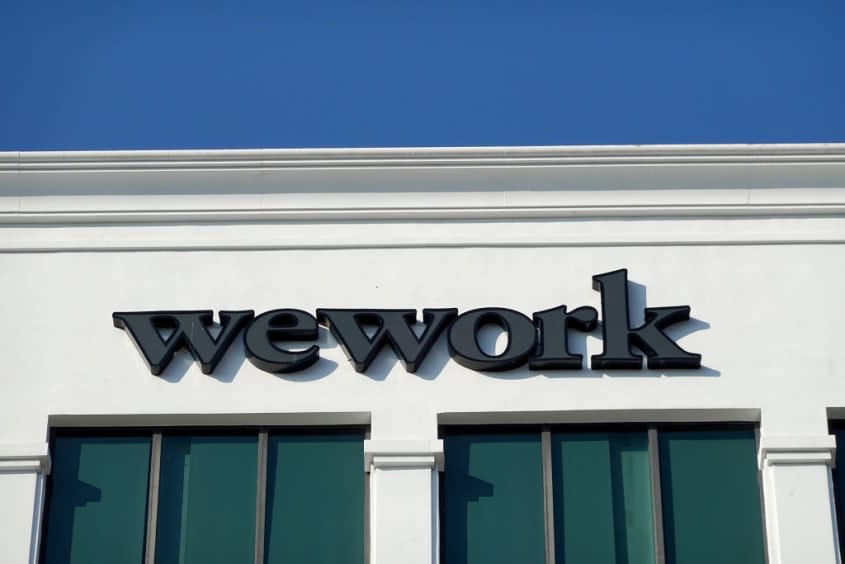Is it the beginning of the end for WeWork?

The end of the road may be near for WeWork. The company, which describes itself as a "global workplace provider committed to delivering flexible solutions, inspiring, safety-focused spaces, and unmatched community experiences," recently released its Q2 2023 financial information, and the outlook seems grim. WeWork has lost nearly $700 million since the beginning of the year, according to its newest SEC filing, and the accompanying press release states that "substantial doubt exists about the company's ability to continue as a going concern."
This pessimism is also felt among WeWork's investors, as the company's price-per-share on Wall Street is currently less than a dollar. This follows a continuing dip in WeWork's stock, which "has plunged 85% so far in 2023," Barron's reported. Amid all of these financial woes, the company said it's exploring a stock sale or sale of assets to try and raise more money.
WeWork has been on the decline for a while. The company first gained prominence in 2019 after failing to go public and has had several rounds of layoffs since. But this appears to be the first real admission from company executives that WeWork, once valued at more than $40 billion, is nearing the end of its lifespan. How did WeWork get here, and what's next?
The beginnings and troubles
Founded in 2010, WeWork was established in Brooklyn by Adam Neumann and Miguel McKelvey and began offering "eco-friendly" coworking spaces across New York City. Within the next few years, the company grew rapidly. In 2014, WeWork was the "fastest-growing lessee of new office space in New York," Forbes reported, and was set to "become the fastest-growing lessee of new space in America" the next year, in addition to branching out internationally.
In 2015, WeWork was named one of Fast Company's 50 most innovative brands and continued raising massive amounts of capital. By 2017, it had a valuation of $20 billion, and in January 2019, it raised money at $47 billion, the company's largest-ever valuation. During this rise, WeWork launched an initial public offering (IPO) later that year, but the company "faced intense scrutiny of its finances and leadership from investors and the media," Insider reported.
While WeWork's business model was known to be "expensive and have little path to profitability since at least 2015," The Guardian reported, it was the company's IPO filing that shed light on its financial troubles. In particular, WeWork had "relied on documents distributed to potential venture investors" that downplayed the company's problems, The Guardian added. Despite "fantastical profit projections … in 2017 WeWork had lost $883 million, despite having some $886 million in revenue." In 2018, the Financial Times reported that WeWork was "worth closer to $3 billion than the $20 billion valuation" it had at the time and lost $1.9 billion from $1.8 billion of revenue.
The full scope of WeWork's business practices revealed by its IPO led to the delay of the public offering. The company laid off 2,400 employees at the end of 2019, and there have been additional layoffs since. While WeWork finally went public with its IPO in 2021, its operating costs have continued to climb, and "since the end of 2017, WeWork has lost $15 billion," The New York Times reported. Neumann would eventually exit the company due to WeWork's exorbitant spending and received a $1.6 billion payout to do so. The brand once worth $47 billion is now valued at an estimated $450 million.
The future
To save itself, WeWork is banking on the continued shift toward remote and hybrid work, as "employers would be more wary of signing long-term leases and would turn to WeWork's flexible models instead," Bloomberg reported. While the outlet noted this is still a possibility, it hasn't been happening quickly enough, and "more customers were leaving and fewer new members were signing up than it had anticipated." This was notably slicing the occupancy rate among WeWork's offices.
The effect of the Covid-19 pandemic on office spaces has left "WeWork heavy on debt and struggling to generate cash," CNBC reported, and "key factors for whether WeWork can remain a going concern include limiting capital expenditures, increasing revenue and seeking capital through debt or equity issuance." WeWork is also looking for a full-time CEO following the departure of Neumann's replacement, Sandeep Mathrani, earlier this year.
It seems that many prior investors may be souring on the idea of WeWork's continuance. Masayoshi Son, the CEO of investment management portfolio SoftBank, "poured billions of dollars into the company — only to later call the investment 'foolish,'" The Washington Post reported.

